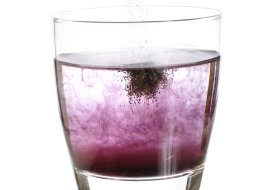
By: Rachael Rettner
Published: 03/17/2015 10:40 AM EDT on LiveScience
A powdered form of alcohol called Palcohol is now approved for sale in the United States, but how safe is this product?
Some health experts say they are concerned that powered alcohol could be abused by minors, or could be more easily more easily hidden and consumed in places where people are not allowed to have alcohol. But others argue that there is no reason the drug would be more hazardous than liquid alcohol.
On Tuesday, the U.S. Alcohol and Tobacco Tax and Trade Bureau approved Palcohol, a powdered alcohol that people can drink by mixing the product with water, according to the company.
So far, the company has approval to sell four flavors: vodka, rum, cosmopolitan and Powderita (a margarita flavor), according to the Associated Press. When a packet of Palcohol is mixed with 6 ounces (177 milliliters) of water, the resulting drink has the same alcohol content as a standard mixed drink, the company says.
Palcohol’s maker expects to begin selling the product this summer. [The Drug Talk: 7 New Tips for Today’s Parents]
However, a number of states are taking steps to ban the product, including Colorado, New York and Rhode Island. It is already banned in South Carolina, Louisiana and Vermont, according to the Wall Street Journal. And powered alcohol cannot be sold in Massachusetts, because the state defines an alcoholic beverage as a liquid, according to the Commonwealth of Massachusetts Alcohol Beverages Control Commission.
Lawmakers are expressing concern that Palcohol could be more easily transported than liquid alcohol, and thus sneaked into places where alcohol is not allowed. “There are very serious concerns about the illegal use of powdered alcohol by young people, possibly even bringing it into schools or other events and locations that prohibit alcohol consumption,” New York State Senator Joseph Griffo, said in a statement last year. There are also concerns about the health risks of people snorting the powered alcohol, Griffo said.
But a packet of Palcohol is much harder to conceal” than liquid alcohol, the company making Palcohol says on its website. A packet of the substance measures 4 inches by 6 inches (10.2 centimeters by 15.2 cm), which is five times bigger than a 50-milliliter (1.7 ounces) bottle of liquid alcohol. “Alcohol in any format is subject to abuse if someone is determined to do so,” the website says.
In addition, people would likely not want to snort the powder because it would burn, and it would take about an hour to snort enough of the powder to be equivalent to one shot of vodka, the website says.
And Palcohol will be subject to the same rules as liquid alcohol, so people will need to be age 21 or older to buy it, the company says.
However, experts remain concerned about the potential for teens to misuse the product. “Youths are going to be very vulnerable to this,” said Dr. Scott Krakower, assistant unit chief of psychiatry at Zucker Hillside Hospital in New York. The flavored powders may appeal to young people, Krakower said.
And because the product is a powder that people can mix into a drink themselves, teens may ingest higher amounts of the powered alcohol, or they may mix it with other powered drugs, which could be hazardous, Krakower told Live Science.
And because Palcohol is a powder, “people will snort it,” even if the company argues that there are downsides to doing so, Krakower said.
Henry Spiller, director of the Central Ohio Poison Center at Nationwide Children’s Hospital, said he is concerned that parents might not lock up the packets as they would bottles of alcohol. “We see a million children poisoned a year just from stuff around the house,” Spiller told Live Science. “We’re afraid these packages may be on the kitchen counter, somewhere available like that.”
If a young child got a hold of a packet of powered alcohol, he or she might consume as much as a shot of alcohol, Spiller said. However, the child would likely not consume more than that, because the experience would not be pleasant.
The powder would create a burning sensation, and would form a gel-like substance when it came in contact with the moisture of the mouth. “It gets gummy and nasty pretty quickly, and the child will be very unhappy, but they would have already ingested the alcohol while all this is happening,” Spiller said.
But Brandon Korman, chief of neuropsychology at Miami Children’s Hospital, said that at this point, there is not enough evidence to say that powered alcohol is any more of a concern than liquid alcohol.
“Alcohol by itself definitely has its own share of traps and hazards,” Korman said. But “I don’t see this yet as any more or less dangerous” than liquid alcohol, Korman said.
He added that it is the responsibility of parents to keep powered alcohol, “like any other dangerous substance, out of the reach and away and access of children.”
Although there might be some people who abuse the product, this does not mean it should be banned, Korman argued. “People are going to find ways to abuse pretty much anything,” Korman said.
Follow Rachael Rettner @RachaelRettner. Follow Live Science @livescience, Facebook & Google+. Original article on Live Science.
- How 8 Common Medications Interact with Alcohol
- 7 Ways Alcohol Affects Your Health
- 11 Interesting Facts About Hangovers
Copyright 2015 LiveScience, a Purch company. All rights reserved. This material may not be published, broadcast, rewritten or redistributed.
]]>
